Python: Check whether a distinct pair of numbers whose product is odd present in a sequence of integer values
Odd Product Pair Checker
Write a Python function to check whether a distinct pair of numbers whose product is odd is present in a sequence of integer values.
Sample Solution:
Python Code :
# Define a function named 'odd_product' that takes a list 'nums' as its argument.
def odd_product(nums):
# Iterate through the indices of the 'nums' list using nested loops.
for i in range(len(nums)):
for j in range(len(nums)):
# Check if 'i' and 'j' are different indices to avoid multiplying the same number.
if i != j:
# Calculate the product of elements at indices 'i' and 'j'.
product = nums[i] * nums[j]
# Check if the product is an odd number (using bitwise AND with 1).
if product & 1:
# If an odd product is found, return True immediately.
return True
# If no odd product is found, return False.
return False
# Define three lists of integers.
dt1 = [2, 4, 6, 8]
dt2 = [1, 6, 4, 7, 8]
dt3 = [1, 3, 5, 7, 9]
# Call the 'odd_product' function for each list and print the result.
print(dt1, odd_product(dt1))
print(dt2, odd_product(dt2))
print(dt3, odd_product(dt3))
Sample Output:
[2, 4, 6, 8] False [1, 6, 4, 7, 8] True [1, 3, 5, 7, 9] True
Pictorial Presentation of the sequence [2, 4, 6, 8]:
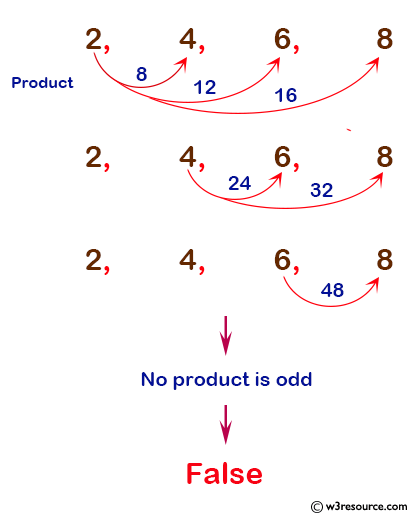
Pictorial Presentation of the sequence [1, 6, 4, 7, 8]:
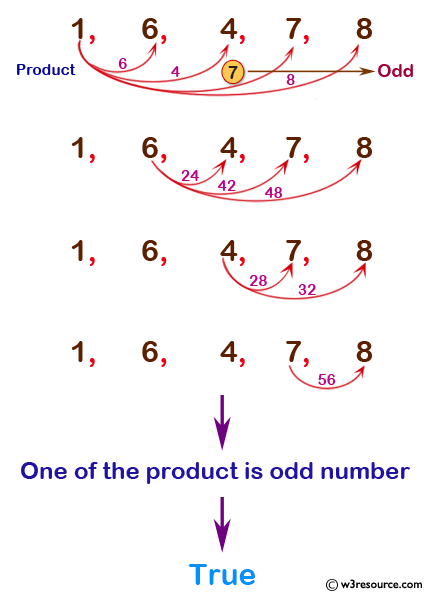
Flowchart:
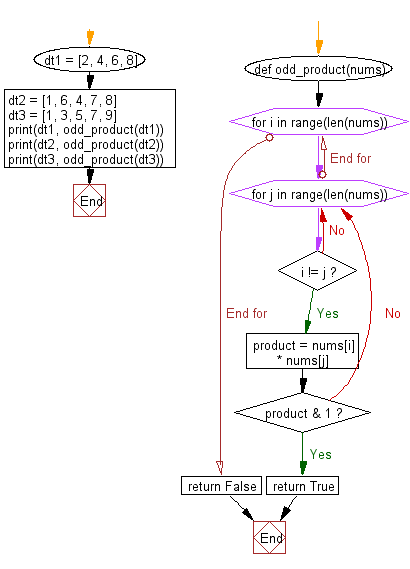
Sample Solution:
Distinct pair of numbers whose product is odd present in a given sequence:
Python Code :
# Import the itertools module to work with combinations of numbers.
import itertools
# Define a function named 'pair_nums_odd' that takes a list 'nums' as its argument.
def pair_nums_odd(nums):
# Create a set of unique numbers from the input list.
uniquelist = set(nums)
# Initialize an empty list 'result' to store pairs whose product is odd.
result = []
# Iterate through all distinct pairs of numbers from 'uniquelist'.
for n in itertools.combinations(uniquelist, 2):
# Check if the product of the pair is an odd number.
if ((n[0] * n[1]) % 2 == 1):
# Create a string representation of the pair.
temp = str(n[0]) + " * " + str(n[1])
# Append the string to the 'result' list.
result.append(temp)
# Return the list of distinct pairs with odd products.
return result
# Define three lists of integers.
dt1 = [2, 4, 6, 8]
dt2 = [1, 6, 4, 7, 8]
dt3 = [1, 3, 5, 7, 9]
# Print the original sequence and the distinct pairs with odd products for each list.
print("Original sequence:")
print(dt1)
print("Distinct pair of numbers whose product is odd present in the said sequence:")
print(pair_nums_odd(dt1))
print("\nOriginal sequence:")
print(dt2)
print("Distinct pair of numbers whose product is odd present in the said sequence:")
print(pair_nums_odd(dt2))
print("\nOriginal sequence:")
print(dt3)
print("Distinct pair of numbers whose product is odd present in the said sequence:")
print(pair_nums_odd(dt3))
Sample Output:
Original sequence: [2, 4, 6, 8] Distinct pair of numbers whose product is odd present in the said sequence: [] Original sequence: [1, 6, 4, 7, 8] Distinct pair of numbers whose product is odd present in the said sequence: ['1 * 7'] Original sequence: [1, 3, 5, 7, 9] Distinct pair of numbers whose product is odd present in the said sequence: ['1 * 3', '1 * 5', '1 * 7', '1 * 9', '3 * 5', '3 * 7', '3 * 9', '5 * 7', '5 * 9', '7 * 9']
Pictorial Presentation of the sequence [1, 3, 5, 7, 9]:
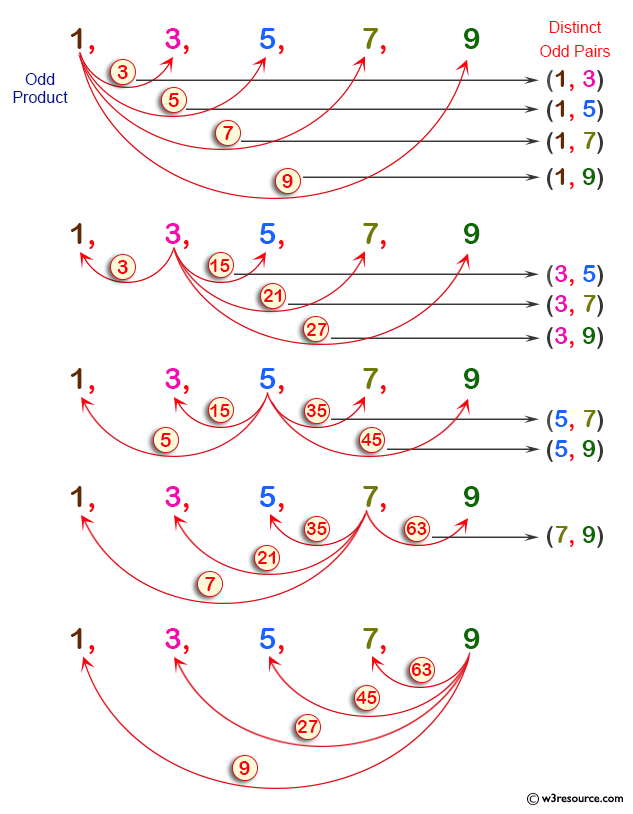
Flowchart:
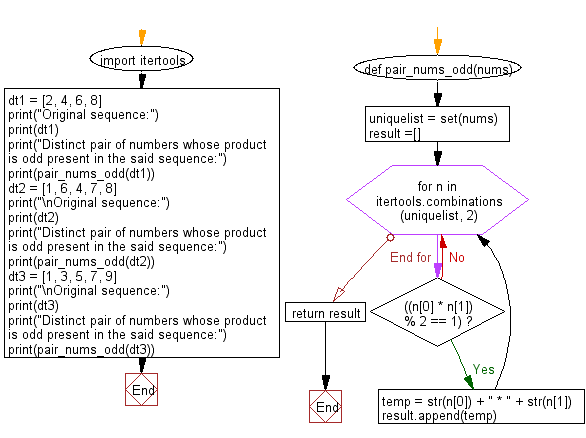
For more Practice: Solve these Related Problems:
- Write a Python function to find all pairs of numbers whose product is odd in a given list.
- Write a Python program to check if at least three numbers exist whose product is odd in a list.
- Write a Python function to count the number of distinct pairs in a list whose product is odd.
- Write a Python program to find the largest odd product possible using any two numbers from a given list.
Go to:
Previous: Write a Python function that takes a positive integer and returns the sum of the cube of all the positive integers smaller than the specified number.
Next: Basic - Part-II.
Python Code Editor:
What is the difficulty level of this exercise?
Test your Programming skills with w3resource's quiz.
